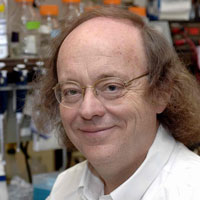
"Construction and Potential Applications of Engineered Minichromosomes in Plants," will be presented by James Birchler from the University of Missouri at 4 p.m., Oct. 2 at the Beadle Center (1901 Vine Street). The seminar is free and open to the public.
The approach taken to produce artificial chromosome platforms was to perform telomere-mediated chromosomal truncation.
The telomeres of plants consist of many repeats of a simple sequence at the ends of each chromosome. When this sequence was transformed into maize via Agrobacterium or via a biolistic approach, the presence of the telomere repeat at one end of the transformed sequence converts the normal repair mechanism that usually connects the introduced sequence into the genome into a de novo telomere formation.
The creation of a telomere during transformation cleaves off the remainder of the chromosome arm. Several minichromosomes have been produced that contain basically only the endogenous centromere with the added genes on the tip of the chromosome.The use of telomere-mediated truncation to produce engineered minichromosomes establishes a foundation for future development of genetically modified plants.
With the ability to make further additions to the artificial chromosome platform, it should be possible to introduce whole biochemical pathways to plants to confer new properties upon them or to use plants as factories for the large-scale production of useful metabolites or pharmaceuticals.
Useful properties that could be combined on a synthetic chromosome include herbicide, insect, fungal, viral and bacterial resistances, drought tolerance, efficient nitrogen utilization, nutritional improvements and favorable quantitative traits to improve yield.
The complete schedule of seminars may be found at http://biotech.unl.edu.
More details at: http://go.unl.edu/oqm